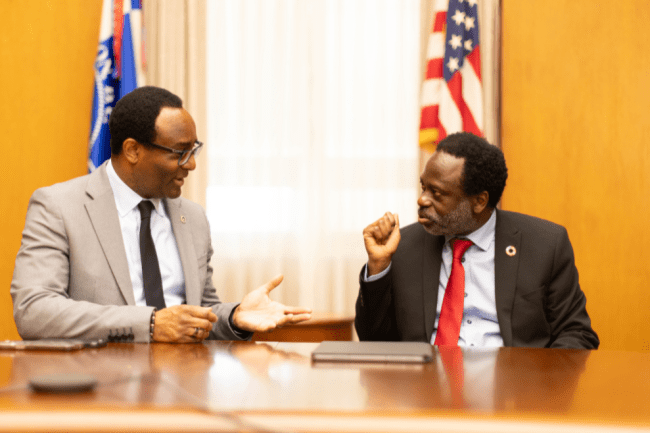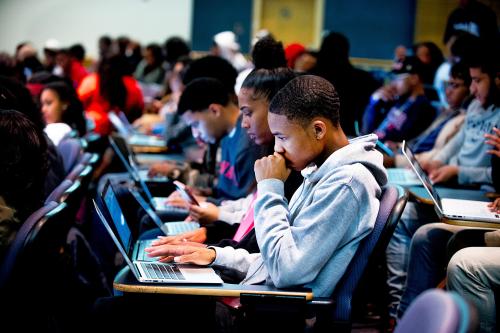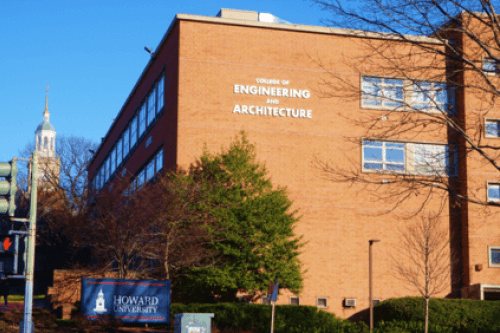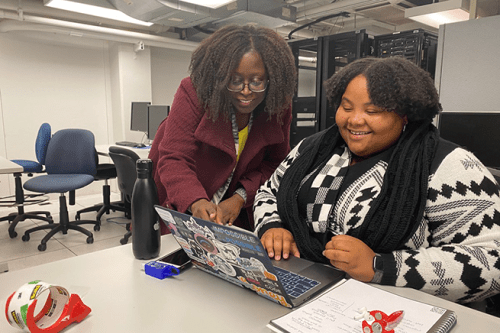Howard University President Ben Vinson III, Ph.D., welcomed Tshilidzi Marwala, Ph.D., undersecretary general of the United Nations and rector of the United Nations University, to campus earlier this week. They discussed potential partnerships related to global education, artificial intelligence, and other technological innovation aligned with Howard's focus on equity and social justice. Their agreed on a jointly shared goal of advancing equity around the world.
The visit was a full circle moment for Howard. After chairing the political science academic department at Howard, Dr. Ralph Bunche worked to help found the United Nations, eventually serving as undersecretary for special political affairs. Howard's hub for international engagement, the Ralph J. Bunche Center, is named for this global statesman.
United Nations University (UNU), established by the United Nations in 1973, functions as a global think tank and postgraduate teaching institution. Rector Marwala, the university’s chief academic and administrative officer, was accompanied by Christina McElwaine, chief operations officer of UNU’s Centre for Policy Research.
UNU encompasses 13 institutes around the world, including locations in Venezuela, New York City, Belgium, Portugal, German, Japan, Malaysia, Ghana, Canada, China, the Netherlands, and Finland. The institutes focus on knowledge generation in key areas including biotechnology; public policy; electronic governance; the environment; human security; material fluxes and resources; sustainability; global health; natural resources; water, environment, and health; information and communication technologies; innovation; and economics. Dr. Marwala shared a vision for UNU which included connecting the world and promoting justice. He noted the institution's operational strategy, which involves knowledge sharing, partnerships, and having a visible impact.
All the problems we actually encounter can be solved using knowledge. But knowledge is not neutral."
"All the problems we actually encounter can be solved using knowledge," Marsala said. "But knowledge is not neutral. It can be created to advance commercial objectives of certain companies, and if ethics are not observed, many people can be hurt. We have to create knowledge that serves the advancement of people."
President Vinson highlighted Howard’s dedication to promoting social justice through cutting-edge technology and noted that Howard’s academic depth — from natural and social sciences to law, medicine, and divinity — position it well as a “ready partner” for global collaboration.
We want to make sure that people fundamentally live better because we believe that when they live better, they contribute better, and the world is better."
“We want to make sure that people fundamentally live better because we believe that when they live better, they contribute better, and the world is better,” Vinson said. “We have to harness new technological waves—not to the ends of those waves, not towards capitalistic or monetary concerns, but rather to the pursuits that we as humans fundamentally believe in.”
Technology was a prominent topic of discussion, especially the emergence of artificial intelligence (AI). President Vinson shared recent technological strides at the University, including the establishment of an AI Council and the launch of a Post-Silicon Validation Laboratory. He highlighted the University’s interdisciplinary approach, which includes a master’s program in Applied Data Science and the Center for an Equitable and Sustainable Society.
Marwala, a distinguished AI scholar, spoke about UNU’s commitment to addressing algorithmic governance and biases inherent in AI. He discussed challenges of AI, particularly related to ethics, as well as the limitations associated with how probabilistic algorithms function. He raised concerns about AI’s reliance on maximum likelihood estimates and noted that AI algorithms often struggle to differentiate between accuracy and the truthful representation of objective reality.
Accuracy is not truth. Accuracy is continuous whereas truth is discreet."
"Nobody talks about truth in an AI course," Marsala said. "They talk about accuracy. Accuracy is not truth. Accuracy is continuous whereas truth is discreet."
Marwala outlined UNU’s plans to launch an AI institute and expand its presence in Washington, D.C., to influence public policy. He also stressed the importance of democratizing data and mitigating algorithmic discrimination.
The conversation extended to Howard’s historical role in fostering international collaboration, particularly in the Global South. President Vinson emphasized the university’s legacy in African diaspora studies and its ongoing partnerships in Nigeria, Colombia, and beyond. Marwala echoed the importance of engaging with Africa and Latin America to address global challenges.
“We cannot talk about what is happening in Africa without being there,” Marwala said. “We cannot address issues of African descent without partnerships with institutions like Howard, universities on the African continent, and institutes in Latin America.”
McElwaine reinforced the need to amplify Global South perspectives in global policy discussions. “We are uniquely placed in the UN system to access spaces of influence and address blind spots,” she said.
President Vinson and both UNU leaders expressed excitement about the potential for a formal partnership between Howard and UNU. Together, they aim to advance research and policy addressing global challenges, including economic and racial inequality, health disparities, and social justice.





